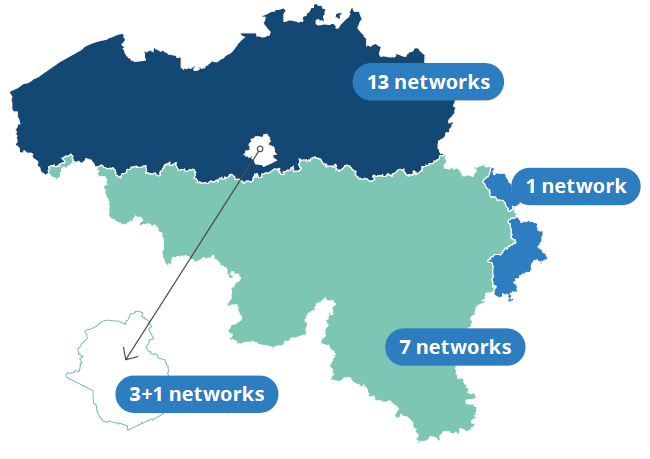What are locoregional networks?
A locoregional hospital network is a cooperation between at least two hospitals, which are geographically contiguous, in the area of (basic) care. Since 1 January 2020, every hospital has been required to be part of one, and only one, locoregional hospital network. A maximum of 13 networks may be formed in Flanders, eight in Wallonia and four in Brussels. The way in which hospitals organise the management of the locoregional care provision within their network is determined by the hospital network itself.
Learn more? https://etaamb.openjustice.be/fr/loi-du-28-fevrier-2019_n2019040712
Working together on care assignments
The basis of the reform introducing locoregional hospital networks is twofold:
‘Care should be provided in the vicinity when possible, specialist care where needed.’
In other words and on the one hand, the government wants to ensure that care is provided as close to home as possible. On the other hand, from a quality perspective, the government wants to concentrate highly specialised care. This will also lead to a more efficient use of resources.
A subdivision of care has been established that divides healthcare into locoregional and supra-regional care assignments.
1. Locoregional care assignments
These are the care assignments that may be offered in any locoregional hospital such as an emergency department and a geriatric or paediatric department. These are services that are needed to guarantee basic care for conventional surgical procedures and medical conditions. Moreover, locoregional care includes services that require patients to come to the hospital regularly for a certain period of time, for example kidney dialysis, the oncology care programme and stroke care. These types of care should be offered in every hospital network, but not in every hospital.
2. Supra-regional care assignments
These are care assignments for a small group of patients, which require considerable expertise and/or investment. These types of care should not be offered in all networks but must be concentrated in supra-regional reference centres. These include specialist stroke care and burn centres.
The goal is to create an appropriate framework that encourages collaboration within the sector. In the next phase, hospitals within the network may choose to bring together different services or care packages in the form of shared services. In this way, resources can be used more efficiently, for example, by making group purchases or by operating heavy equipment together.
As a result of quality improvement and specialisation, locoregional hospital networks will become more attractive to healthcare providers and patients. Mutual cooperation between reference centres, which offer supra-regional care, will allow patients to receive further follow-up in a hospital near their place of residence after undergoing a treatment.

